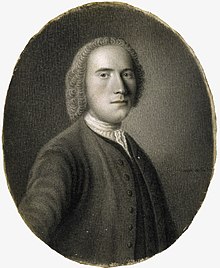
Back جورج موراى (عسكرى) ARZ لرد جورج موری Persian George Murray (général jacobite) French Seòras Moireach (ginearál) Irish Am Morair Seòras Moireach Scots/Gaelic George Murray (1694-1760) Italian George Murray (militair) Dutch Мюррей, Джордж (лорд) Russian George Murray (jakobit) Swedish
Lord George Murray | |
|---|---|
 Lord George Murray | |
| Born | 4 October 1694 Huntingtower, Perth, Scotland |
| Died | 11 October 1760 (aged 66) Medemblik, the Netherlands |
| Buried | Bonifaciuskerk, Medemblik[1] |
| Allegiance | |
| Years of service | 1711–1715 (British Army) 1715–1719 (Jacobite) 1745–1746 (Jacobite) |
| Rank | Lieutenant (British Army) Lieutenant General (Jacobite) |
| Battles / wars | |
| Relations | John Murray, 1st Duke of Atholl (father) John Murray, 3rd Duke of Atholl (son) |
Lord George Murray (4 October 1694 – 11 October 1760), sixth son of John Murray, 1st Duke of Atholl, was a Scottish nobleman and soldier who took part in the Jacobite rebellions of 1715 and 1719 and played a senior role in that of 1745.
Pardoned in 1725, he returned to Scotland, where he married and in 1739 took the oath of allegiance to George II. When the 1745 Rising began, Murray was appointed sheriff depute to Sir John Cope, government commander in Scotland but then joined the Jacobite army when it arrived in Perth on 3 September. As one of the senior commanders, he made a substantial contribution to their early success, particularly reaching and successfully returning from Derby.
However, his support for the 1707 Union set him apart from the majority of Scottish Jacobites, and previous links with the government meant that many viewed him with suspicion: combined with a perceived arrogance and inability to accept advice, this reduced his military effectiveness.
After the Battle of Culloden in April 1746, Murray went into exile in Europe and was excluded from the 1747 Act of Indemnity. He died in the Dutch town of Medemblik in 1760, and his eldest son, John, later became the 3rd Duke of Atholl.
- ^ "Bonifacius Church (Bonifaciuskerk), Medemblik". Holland Tour. Retrieved 26 February 2019.